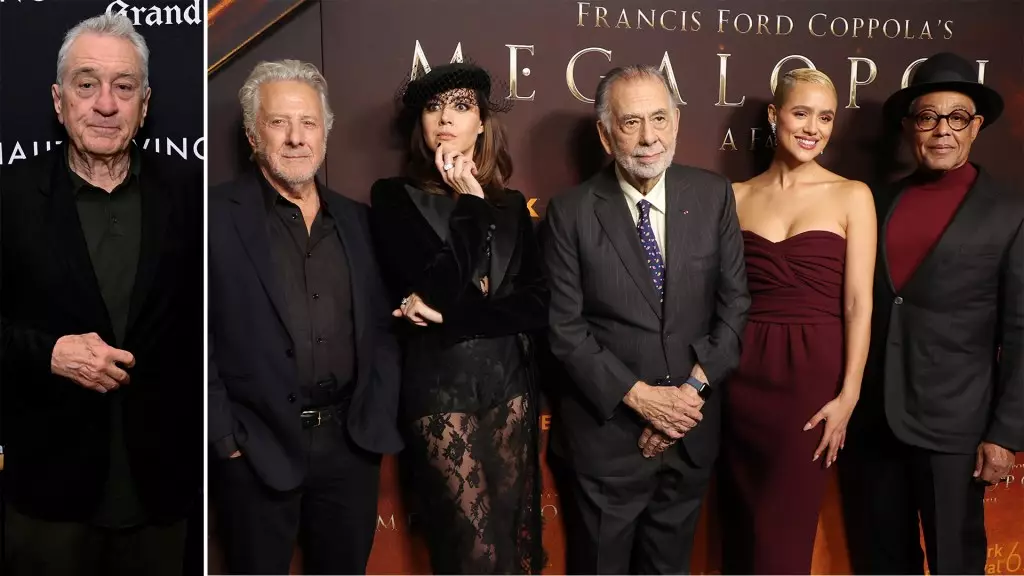The intersection of film and politics has always sparked engaging conversations, and a recent event at the premiere of Francis Ford Coppola’s *Megalopolis* was no exception. The film’s stars, Robert De Niro and Spike Lee, alongside director Coppola himself, shared their insights on the state of cinema, the role of artists in society, and, most notably, the political climate in America. The discussions provoked laughter, contemplation, and serious political dialogue, ultimately revealing how deeply intertwined these realms are in contemporary discourse.
During the New York premiere, Robert De Niro posed a hypothetical scenario that instantly resonated with the audience. Imagine if Donald Trump were directing a film. De Niro’s deadpan delivery contrasted sharply with the audacious nature of his comment, leading to a mix of laughter and contemplative nods among listeners. “He cannot do anything. He cannot hold anything together,” De Niro asserted, articulating a broader sentiment: the fear that certain individuals in positions of power could threaten the very fabric of society. His comments pushed boundaries, provoking necessary discussions about leadership and artistic integrity.
This moment encapsulated not only De Niro’s comedic timing but also his longstanding critique of political figures—particularly Trump—through the lens of cinema and narrative structure. The mere idea of Trump directing a film symbolizes a chaotic, fragmented approach to storytelling—one that contrasts sharply with the disciplined artistry that Coppola, De Niro, and Lee plant at the forefront of their cinematic endeavors.
A Shared Responsibility: Cinema and Civil Discourse
The Q&A session illuminated a vital theme: the responsibility of artists in shaping public discourse, especially in times of political strife. As De Niro expressed concerns about the erosion of democratic values, he called for collective action against the current political establishment, stating, “We have to go at this wholeheartedly to beat the Republicans.” His passionate plea pushed the conversation beyond mere art and into the realm of civic duty. Voting, he emphasized, is not just a right—it’s a necessity.
Spike Lee echoed these sentiments, reinforcing the notion that participation in democracy—like casting a vote—is akin to participating in a collective narrative. “As my sister says, forward not backward,” Lee proclaimed, urging not only engagement but proactive involvement. This shared dialogue between the two renowned filmmakers reveals their understanding of the film industry not simply as an entertainment medium, but as a powerful platform for societal change.
As they reflected on their historical collaborations and experiences in the industry, the trio shed light on the evolution of filmmaking itself. The backdrop of *Megalopolis*, a film that has been in the works for nearly two decades, stands as a testament to Coppola’s resilience and vision. It is a project that required not just considerable artistic ambition but also financial fortitude, with Coppola investing his personal wealth into this extraordinary venture.
The significance of *Megalopolis* cannot be underestimated—it highlights the ongoing struggle to balance artistic integrity with commercial pressures in an industry increasingly driven by marketability and franchise potential. As audiences react to such ambitious projects, the dialogue surrounding them raises questions about what cinema can and should address in contemporary society.
Artistic Freedom and Ethical Dilemmas
Coppola’s choice to cast actors with differing political ideologies—one prominent role going to Trump supporter Jon Voight—invites a deeper discussion about artistic freedom versus ethical responsibility. The director’s belief in the power of art to bridge divides is commendable, especially in a landscape where partisan affiliations often overshadow personal relationships and professional collaborations. “We can disagree on a film set but that humanity can prevail,” Coppola stated, emphasizing the need for discourse rather than division.
This notion of coexistence in creativity stands in contrast to the current cultural climate. It serves as a reminder that while films may emerge from differing worldviews, the ultimate aim should be to reflect and confront the complexities of human experience. The multifaceted nature of *Megalopolis* promises to evoke varied interpretations, showcasing the potential for cinema to be a mirror to reality.
As *Megalopolis* gears up for a wide release, the mixed reception it has already garnered poses intriguing questions about its place in cinematic history. The ambivalence surrounding its premiere at Cannes indicates that while the film’s ambition is unquestionable, its execution may elicit diverse opinions. However, what remains certain is that it encourages discourse—an essential aspect of a vibrant democratic society.
The artistry of filmmakers like Coppola, De Niro, and Lee transcends the screen; it is woven into the very fabric of societal dialogue. Their collective voices serve not only to entertain but also to provoke thought and mobilize citizens. In a time where the stakes are higher than ever, their insistence on political engagement invites us all to participate in shaping the narrative of our future—both on-screen and off.


Leave a Reply